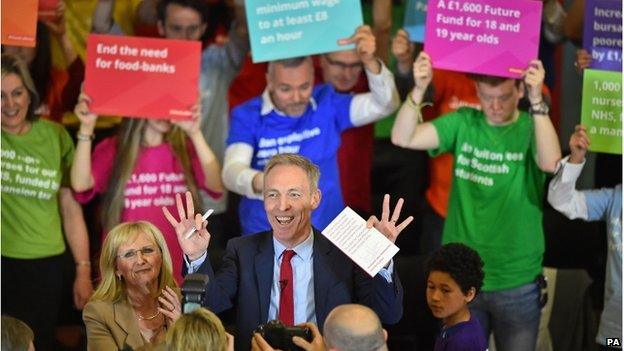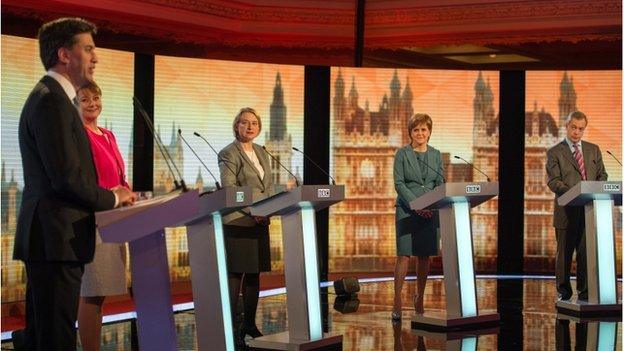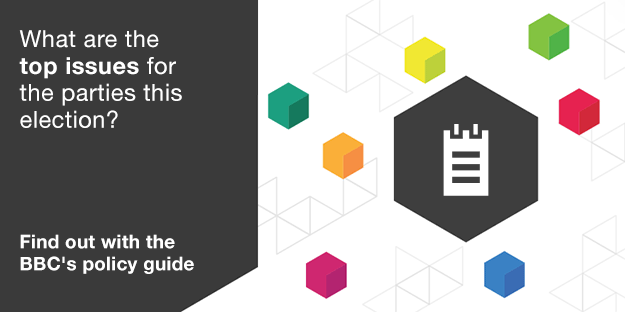Election 2015: Labour looks to second phase to win over sceptics
- Published

Scottish Labour leader Jim Murphy at the manifesto launch in Glasgow
Inevitably, one hears talk that this is a notably prolonged General Election campaign. And so it is, courtesy of the fixed term parliament initiative.
Of course, we referendistas look upon such comments with a gentle, indulgent smile. Lengthy? You think this is lengthy? Where were you in 2011/12/13/14?
However, given the duration of this campaign, it has tended to fall into two sections. Depending upon your outlook, you will be relieved or glum to learn we are now into part two.
In any case, forget the length. Consider the quality.
This is, quite simply, an engrossing contest. Across the UK, where the main parties appear close - and especially in Scotland where polls suggest a mild revolution may be under way.
TV debates
At Labour's Scottish manifesto launch this morning, I took the opportunity to discuss that putative revolution with one or two who have stepped down voluntarily from the Commons - plus several whose fate rests with the voters.
One said to me that, in this second phase of the campaign, there are discernible reasons for relative contentment in the Labour team. The UK manifesto launch was judged a success. Ed Miliband has performed capably in TV debates - despite the plaudits understandably directed at Nicola Sturgeon.
The Tories have failed to establish an apparent poll lead - which they need if they are to overcome seat boundaries which benefit Labour. Plus, Labour strategists reckon David Cameron may regret limiting his debate appearances.

Labour judge that Ed Miliband did well in the TV debates
And then, said my interlocutor, there's Scotland. Once the source of a guaranteed battalion for Labour. Now the cause of considerable disquiet.
So what do they hear on the doorsteps? As ever with the voters, a much more nuanced, much more complex picture than bald polling depicts.
Firstly, there is a general feeling of revulsion with politics - or, more precisely, with habitual Westminster politics. Labour gets the backlash from that. More than the SNP who are still seen by many as insurgents, rather than devolved governmental incumbents.
Secondly, there are post-referendum factors. Some Labour voters, it would appear, are lost to the party with which they traditionally identified. They voted Yes in the referendum and will not return to siding with Labour at this election - even although they acknowledge the different nature of the contest.
Authentic uncertainty
Others, it appears, are undecided. One candidate told me that "undecided" could be code for: "I'm voting SNP but can't bring myself to tell you." Bit like an alternative version of the "secret Tories" who returned John Major in 1992.
By contrast, most candidates insist this is authentic uncertainty. Folk hear the SNP offer to strengthen Scotland's voice. They hear Labour's insistence that voting SNP weakens the prospect of ousting the Tories. They hear the SNP rebuttal that the two parties, combined, can lock David Cameron out. They hear the counter argument……..they hear, they hear.
Naturally, these Labour candidates are keen to discern issues and attitudes which might solidify Labour support.
Hence they are happy with a manifesto which emphasises the offer to working class Scots: raising the minimum wage; banning zero hours contracts; tackling the root causes of poverty.
Beyond individual questions, the most common doorstep challenge apparently, is trust. You say vote Labour and defeat the Tories. But you said that before and it didn't happen. You say vote Labour and expect change. But will you deliver?
So the factor which would be most likely to promote Labour's prospects in Scotland would be clear signs that England was moving Miliband's way. That might persuade the Scottish sceptics - or maybe just enough of them to make something of a difference.
Genuinely intriguing.
